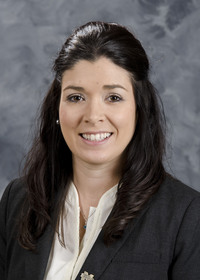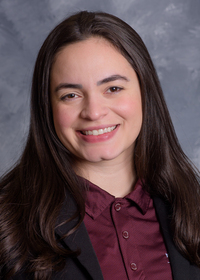Information Possibly Outdated
The information presented on this page was originally released on April 1, 2004. It may not be outdated, but please search our site for more current information. If you plan to quote or reference this information in a publication, please check with the Extension specialist or author before proceeding.
Program trains better beef cattle producers
MISSISSIPPI STATE -- Beef may be "what's for dinner," but that's because producers growing cattle are putting a good product on the market for consumers to enjoy.
Mississippi's beef cattle had a production value of about $190 million in 2003, and most of this is from small operations. To support this industry in the state, the Mississippi State University Extension Service created an educational certification program for beef cattle producers and veterinarians.
Dr. Terry Engelken, MSU College of Veterinary Medicine beef production medicine specialist, heads the Beef Quality Assurance Certification Program. The program is a cooperative effort between MSU's Extension Service, College of Veterinary Medicine and Department of Animal and Dairy Science; Mississippi Cattlemen's Association; Mississippi Farm Bureau; and the Mississippi Veterinary Medical Association.
"This program emphasizes guidelines that will help producers avoid quality defects in their product," Engelken said.
Quality defects reduce the selling price of cattle, lowering the profits a producer receives for each head of cattle. The quality assurance program is intended to train producers in ways to improve their production processes on the farm to avoid these discounts.
"Poor animal handling and poorly designed facilities will lead to an increase in lame cattle and bruising, and lower prices," Engelken said. "Cows with a poor temperament have been shown to injure themselves and the people who work with them more often, and calves from these cows do not grow as quickly during the feeding period as calves from calmer cows."
The program encourages producers to treat physical defects promptly, and castrate and dehorn calves before market to avoid a discount at sale. Program participants are taught the importance of record-keeping, following label recommendations and dosages on medications and vaccinations, and providing an economical nutrition program.
"Working with your local veterinarian to design a cost-effective herd health program should improve reproductive efficiency and profitability as well," Engelken said.
Producers also are encouraged to carefully select injection sites for vaccinations. Judd Gentry, Panola County Extension director, explained how administering an injection in a poorly chosen site can reduce the selling price of beef cattle.
"Give injections in the neck, not in other areas of higher quality meat," Gentry said. "When that animal is butchered, they'll have to cut out a large piece of meat where that injection was made."
Gentry said about 10 percent of his area's beef cattle producers are certified in this program. While beef sold by these producers does not bring a premium, it does improve the quality of the beef sold.
"The result is supplying the industry with a higher quality animal," Gentry said.
When it comes time to sell an animal, training offered through the Beef Quality Assurance Program can help with that, too.
"The biggest determinant of what price the cattle bring is how they are marketed," Engelken said.
He cited an example of a group of about six Mississippi producers who pool their cattle in truck-load lots and sell them using satellite video to an audience of national buyers.
"This method of selling allows these producers to capture added value," Engelken said. "This group of producers always has a documented animal heath program and written information for the buyer on what vaccines and dewormers were used and when they were given."
Engelken said some buyers appreciate having a health history of the animals and now actually request it.
To complete the Beef Quality Assurance Certification Program, producers must attend a training session, pass an open-book test and agree to a series of best management practices designed to improve the quality of their cattle. Those who complete the training are given a numbered certificate attesting to their level of training and commitment to improved beef cattle production.
Contact: Dr. Terry Engelken, (662) 325-1287




